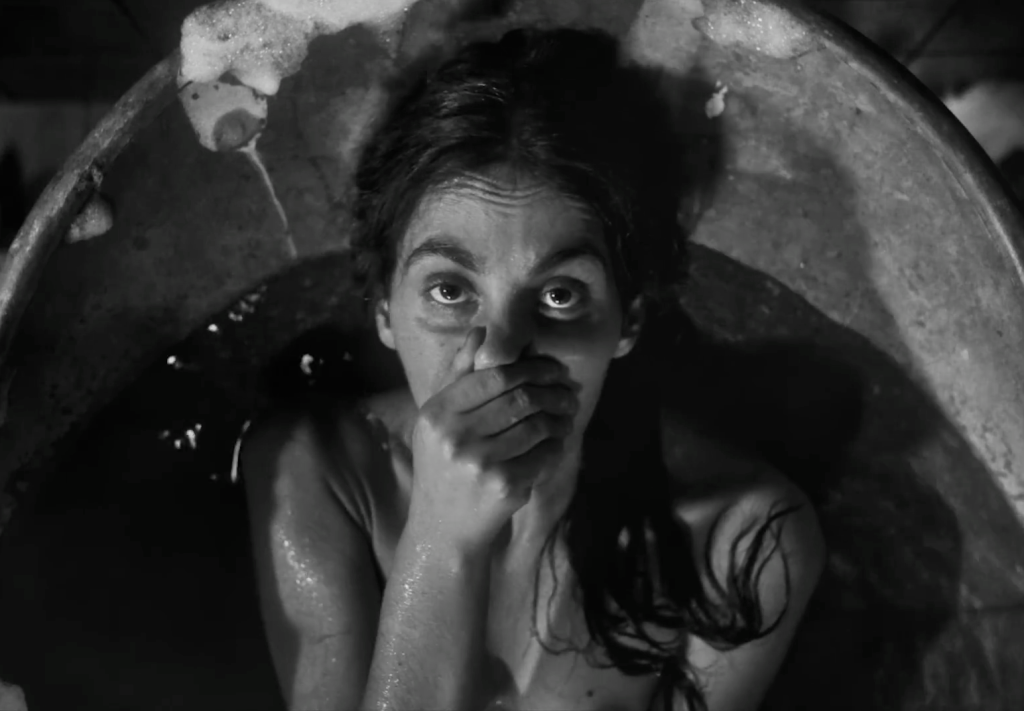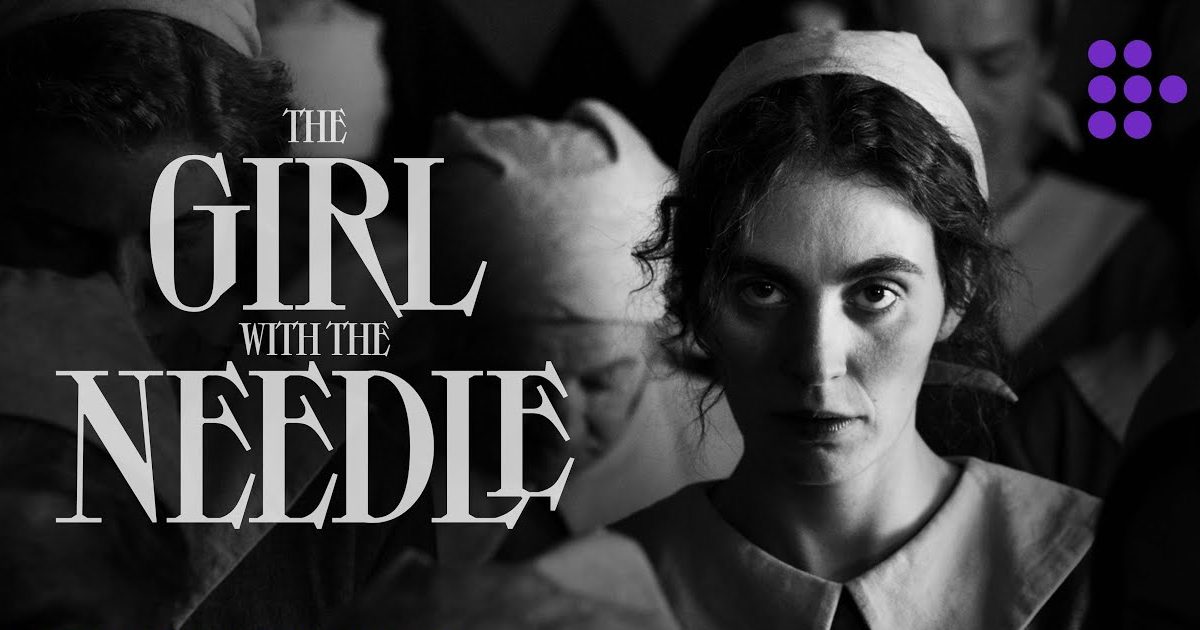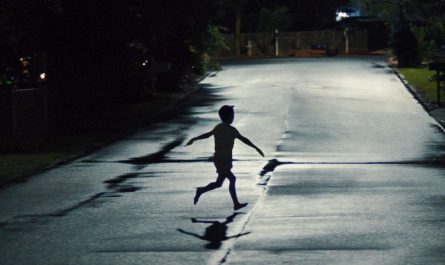Spoiler Alert!
This article contains spoilers of The Girl with the Needle!
“The Girl with the Needle,” directed by Magnus Van Horn and starring Vic Carmen Sonne and Trine Dyrholm, is a haunting historical thriller that plunges viewers into the harsh realities of post-World War I Copenhagen. The story follows Karoline, a young seamstress who is abruptly evicted from her apartment. The story is set in Copenhagen post-World War I. She works in a textile factory, yet she can’t afford much. Her husband disappeared in combat and hasn’t been found dead nor alive. When she requested the widow funding, she was denied. As she continued working in the factory, she fell in love with the owner, and she became pregnant. One afternoon, Karoline’s husband shows up after work with a face mask covering his injury from the war. Peter, her husband, explained he couldn’t gather the courage to face Karoline after his injury, and that’s why he’s been missing for a year. Karoline then said she moved on, met Jørgen, and is expecting his baby.
She then asks Jørgen if they will marry, and he agrees. When Jørgen, her boss, takes her home to meet his mother, she requests that Karoline get checked by a doctor. Jørgen’s mother, a baroness, is told by a doctor that Karoline is pregnant. The baroness refuses to fund or host the wedding. Jørgen, pressured by his mother, cruelly abandons Karoline. She is left jobless, pregnant, and alone. Karoline tries to abort with a needle inside a bathtub in a public bathroom. When she passes out from the pain, Dagmar, seemingly a kind-hearted woman in her sixties, presents an alternative: carry the baby to term and “place it with a loving family” for a price.
One day, she sees a flyer of her husband, Peter, working in the circus. When she attends the spectacle, the ringmaster presents an “injured soldier” and challenges the audience to touch his destroyed face. In a chilling moment, Karoline places her finger inside his hollow eye socket. Then she is rechallenged to kiss him, and she does so. They both go back to Karoline’s new flat, and Peter experiences a PTSD nightmare. Karoline tries to calm him down, and for several weeks, they support each other; even Peter offers to father the baby and take care of it. However, the morning when Peter went looking for a crib, Karoline sneaked out of the apartment, visited Dagmar, and gave up the baby. Dagmar insists that wealthy families, doctors, and lawyers will provide the child with a better future. She emphasizes to Karoline that she “did the right thing”.
Karoline then offers Dagmar her wet nurse services. After begging, Dagmar accepts, and she initially wants Karoline to feed Erena, her 6-year-old daughter. Dagmar drinks ether for occasional pains she experiences and shares it with Karoline once in a while. One day, a 13-year-old girl arrives and hands over her mother’s baby. Dagmar reassures her, just as she once reassured Karoline. Dagmar allows Karoline to take care of it for longer weeks than usual until a night when Karoline slaps Erena. As she was sleeping with the new baby, Erena showed disturbing behavior after getting her milk denied by Karoline. Angry, Erena attempts to smother the baby with the blanket. Karoline quickly wakes up, stops her, slaps her, and questions her violent instincts.
The next day, Dagmar takes the baby away, claiming she has found it a family. Karoline, feeling punished, follows Dagmar and makes a horrifying discovery: Dagmar has been killing the babies all along, disposing of them in the city’s drain system. When confronted, Dagmar calmly admits to murdering Karoline’s baby, justifying her actions by saying the world is too cruel. She drugs Karoline with more ether, explaining that it will help her cope. Karoline, trapped in a haze of addiction, begins to understand the extent of Dagmar’s twisted ideology. Later, while still drugged, Karoline hears her friend, Frida, bringing another baby to be sold. Dagmar pressures Karoline to kill the baby, but when she refuses, Dagmar does it herself. Erena watches but covers her ears and closes her eyes (murder has been normalized for her). Dagmar forces Karoline to hold the baby while she kills it and later burns the body. Frida returns, demanding the baby and threatening to call the police. When the police arrive, Karoline, overwhelmed, jumps out of a window, taking her own life. Dagmar is arrested, but the true horror of her actions is revealed when the authorities find Dagmar’s notebook with records of 35 murdered babies. Later, it is confirmed that Karoline survived the jump.
During her trial, Dagmar remains eerily composed, claiming that she was only helping the mothers by relieving their suffering. When the judge asks why she did it, she responds, “It was necessary.” She argues that society fears acknowledging the truth, that unwanted children only bring pain, and says she should be awarded a medal instead of being punished. Her nihilistic worldview echoes the dangers of unchecked moral detachment.
In the aftermath, Erena is placed in an orphanage. Later, Karoline returns to adopt her. The orphanage worker remarks that few people adopt seven-year-old girls and expresses gratitude for Karoline’s kindness. In the final scene, Erena and Karoline reunite, running into each other’s arms, suggesting that despite the darkness of their past, they may still have a future together.
The movie is inspired by real events, leaving the audience to wonder about the true story behind the horror. The film never portrays Karoline or Erena as villains; both are victims of their circumstances, trapped in a world that failed them.

A Film That Challenges Our Perception of History and Morality
This is one of those movies I went into watching fully blind without knowing what it was about and wishing to be surprised. I was definitely in awe after I finished watching. Although it’s eerie and disturbing, I appreciated watching a story that portrayed women in World War I. We often see war stories focused on soldiers, but “The Girl with the Needle” brings attention to the women left behind.
Peter’s storyline is equally tragic; he represents countless veterans abandoned by the very nations they fought for. The movie shows Peter experiencing PTSD and portrays how Karoline, the young wife, tries to help him cope, and the old landlady is annoyed at Peter. Peter had no choice but to join the circus and face humiliation for money and survival. He was left on his own to deal with the consequences of an injured body and a fractured mind. Is that not what post-modern countries do to their veterans? How many soldiers have had their homeland’s back whilst being pushed to the sidelines after fighting? Their stories are so disturbing and heartbreaking that civilians, who carry no responsibility for those soldiers but should show empathy and respect, can’t do so. Stories about veterans and soldiers are so overwhelming to hear and process that for average citizens, it’s easier to ignore such stories and participate in the marginalization of the victims who were once soldiers.
As I was watching the movie, I couldn’t help wondering: If Dagmar is charging these women for accepting the babies, how isn’t that the business alone? To my surprise, it was. There’s a scene were Dagmar receives a baby with harelip and tells Karoline, they’ll have to give that one to the orphanage because no one will buy it. If she was already lying about the baby’s destiny, then why lie about sending one to an orphanage? I think it’s part of keeping her lies believable, but it’s yet another sign of her sickness. After seemingly giving that baby to the orphanage she feels sad for the rest of the day and tells Karoline “Sometimes I feel so lonely. I’m here. Many lives pass through this apartment. It leaves a trace”, and Karoline answers, “sometimes I regret what I did”, referring on gifting away her child.
Why is Dagmar sad about those babies if she continues killing them? I think this is connected to her initial motives. She feels forced to kill those babies because she has a twisted perspective, thinking it’s for the best. The best for the world, the best for the killed children, and the best for the mothers. In her psychopathic view, she is putting everyone out of their misery. But why would someone feel compelled to put others outside of a misery they didn’t ask to be put out of? I do not defend Dagmar’s actions, nor will I justify them by saying that she was a victim of her times. However, I believe that Karoline, Dagmar, and the many women who gifted their unwanted children away are a consequence of their political and historical context.
Violent times force humans to normalize violence in order to endure it, but believing the normalization of violence will have no negative effect on people and communities is false. Dagmar did not fight in a battlefield, nor was she pushed to become a soldier. The level of PTSD will never equate to a soldier’s, but a Nihilistic spirit might. Dagmar’s nihilism is the perfect example of the dangers within it that Nietzsche warned us about. He writes, “a nihilist is a man who judges of the world that it ought not to be, and of the world as it ought to be that it does not exist.”, in that case, there isn’t a lack of highest values, but it sees them as unattainable or impossible. Nietzsche believed that nihilism is dangerous because it can lead to psychological harm, the destruction of society, and the end of morality, religion, and metaphysics.
The period between World War I and World War II was marked by nihilism, there was a common state of meaninglessness and despair. Nihilism could have led people to detachment from life, making them averse to it. Nihilism deepens on a fundamental repudiation of life. Nietzsche argued that nihilism is a terrible psychological problem, a coping mechanism with deadly consequences. Can we say that Dagmar was a nihilist if she killed those babies but didn’t commit suicide? I dare say yes. She was actively killing those babies because she thought she was doing them a favor; her aversion and rejection of life is visible in her actions towards those babies. She even justified herself at court, saying, “The world is too cruel”. By living in a cruel, purposeless world, she believed the babies were better off dead. However, she was also passively killing herself by abusing ether. The biggest question is: if she was deeply and purely a nihilist, why didn’t she kill herself from the start?
Kaitlyn Creasy in Psyche talks about Nihilism:
The individual who believes that life is worth living only if there is some higher purpose to it, in which all human beings participate. For such an individual, it is not only nihilistic to disavow her belief in a higher purpose; it is also nihilistic for her to believe in a higher purpose. After all, Nietzsche argues, if we think life is worth living only if there is a higher purpose in which we participate – and it turns out that there is no higher purpose in which we participate (something that Nietzsche insists we must accept) – then one’s belief in a higher purpose is life-denying because it implicitly devalues life as it actually is (that is, as devoid of higher purposes).In other words, given that there is no higher purpose, belief in a higher purpose as that which is required to make life worth living covertly devalues life: it indicates that life, as it actually is, is not worth living (Creasy, 2023).
Dagmar believed in a higher purpose, but in the lack of finding one, life became meaningless. If life has no purpose and only brings pain and suffering from a cruel world, those babies’ lives were pointless. In her nihilistic and psychopathic perception, the babies were better outside of that world. Nietzche also warned us about the need to overcome nihilism. I believe that, as humans, we must learn how to live with pain, suffering, and unwanted circumstances as they are inevitable. Dagmar said unwanted children only bring pain, but if that pain wasn’t brought to her, why get herself involved in other people’s lives? Dagmar said, “I just did what you’re afraid to do, you’re too afraid to admit it”, in a way she thought she was saving them from more suffering. So, answering my previous question – “If she was deeply and purely a nihilist, why didn’t she kill herself from the start?”- Then, she didn’t harm herself because, in her mind, she sacrificed herself to prevent suffering and grief on others without realizing she caused even a bigger tragedy. Dagmar’s character raises disturbing philosophical questions. She sees herself as a savior, removing suffering before it begins. But her actions illustrate Nietzsche’s warning about nihilism. She doesn’t just reject meaning—she believes meaninglessness justifies her crimes.
Erena is another symbol of the consequences of her times. Surrounded by a violent world with multiple wars at the same time, the early century Copenhagen in which disappearing’s were common and hard to trace due to the lack of registers, and a serial-killer mother, in her eyes murdering was also desensitized. She grew up in a household that believed unwanted babies were inconveniences and ones that could easily be removed. Therefore, at the moment she was first inconvenienced by a baby and denied milk, she thought killing the baby would simply remove her problem.
Karoline and the rest of the mothers who gave up their children are also victims of their environment. If, as Peter said, “babies are gifts not supposed to be gifted”, why did the women sell their children? I think they are a product of desperation from survival. If they cannot even help themselves because of a lack of resources, lack of financial opportunities, lack of security, or missing husbands, how will they provide shelter and care to a child?
Judging these women for what they did, in exception for Dagmar, is an error by trying to judge history with a post-modern lens. I’ve never lost a husband, faced famine, never mind lived through a World War. These women were lied to and comforted, making them think their babies had hope and better chances at life than them. Unfortunately, they couldn’t escape their reality, and by trying to do so, they condemned their babies to a horrific end.
We could argue these women could’ve avoided their babies’ tragic ending by making better choices, but how could they make better choices if, again, these women were desperate, and desperate times conduce to desperate measures? If they were trying to survive and overcome their struggles, there was little to no time left for rationalizing and reflecting further than what they did. The film never portrayed Karoline and Erena as villains but rather depicted how they overcame tragedy. The film is based on the true-life story of Dagmar Johanne Overbye (1883-1929), a serial killer guilty of murdering between 9 and 25 children, amongst them her son, between 1913 and 1920. In 1921, she was sentenced to one of the biggest and most important trials in the history of Denmark. This gave place to legislation regarding children’s caretakers. She was given a life sentence.
In the film “The Girl with the Needle”, the women who gave up their children in hopes of them having a better life truly believed they were doing the best they could. They couldn’t save themselves, but they tried saving their children from a similar fate. In the end, Karoline saves herself and Erena. The true horror of “The Girl with the Needle” is not its violence but its realism. The film, based on the real-life crimes of serial killer Dagmar Johanne Overbye, forces us to ask: How much can we blame individuals when they are also victims of their environment?
This is not just a story of a murderer. It’s a story of war, trauma, and the desperate choices people make to survive. It forces us to question morality, justice, and the consequences of normalizing violence.
Creasy, Kaitlyn. For Nietzsche, nihilism goes deeper than ‘life is pointless’. Psyche. (2023) Available in https://psyche.co/ideas/for-nietzsche-nihilism-goes-deeper-than-life-is-pointless






You helped me a lot with this post. http://www.kayswell.com I love the subject and I hope you continue to write excellent articles like this.
Sustain the excellent work and producing in the group! http://www.kayswell.com
You’ve the most impressive websites. http://www.kayswell.com
May I have information on the topic of your article? http://www.kayswell.com
May I request more information on the subject? http://www.kayswell.com All of your articles are extremely useful to me. Thank you!
I think other website proprietors should take this web site as an model, very clean and fantastic user genial style and design, let alone the content. You’re an expert in this topic!
Thanks for sharing. I read many of your blog posts, cool, your blog is very good. https://accounts.binance.info/fr-AF/register-person?ref=JHQQKNKN
Your point of view caught my eye and was very interesting. Thanks. I have a question for you.
как достать голоса в вк https://sitetestcomment.com программа для взлома вк видео покупка голосов вк как обновить айфон
взлом инди кот вк как набрать голоса в контакте программа прогона по трастовым сайтам
лучшие программы прогонов сайтов голоса вконтакте бесплатно взлом игры зомби ферма вконтакте
спецпредложения вконтакте на голоса https://sitetestcomment.com vk com голоса exe подарки в контакте бесплатно скачать накрутка голосов в вк
трастовые сайты прогон стоимость одного голоса вконтакте получить голоса в контакте платно
официальный сайт вак с индексированием журналов iphone голоса вк бесплатно сайт
Can you be more specific about the content of your article? After reading it, I still have some doubts. Hope you can help me. https://www.binance.info/register?ref=IHJUI7TF
I don’t think the title of your article matches the content lol. Just kidding, mainly because I had some doubts after reading the article.